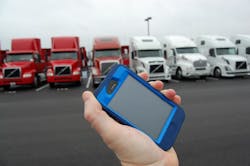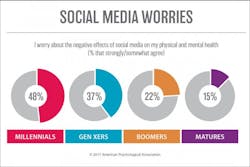There’s been an awful lot of talk regarding the ongoing “digitization” of the trucking industry, in no small part because, well, almost everyone working in this most critical of industries (me included!) has a smart phone on their belt, in their hip pocket or purse.
Technology is just deeply interwoven into everyday life now; at the office, in the truck cab, at home, at school. It’s everywhere. There’s no escaping it.
Thing is, how is this constant exposure to the “digital world,” especially when it comes to social media, affecting our humanity? What are the psychological ramifications?
And, from a motor carrier’s perspective, do those “ramifications” create more long-term negative effects for truck drivers, who, often due to the solitary nature of the job piloting big rigs to and fro across the country, are probably relying more and more on digital connections and social media in their daily lives?
Well, if a new report just out from the American Psychological Association (APA) is any guide, the “ramifications” of constant “digital exposure” aren’t good; indeed, the group coined a new term to highlight the fallout from constantly tapping into all this technology: digital stress.
According to the APA’s report – dubbed Stress in America: Coping with Change – in the 10 years following the widespread emergence of smart phones, Facebook and Twitter, more than four out of five adults in the U.S. (86%) said they “constantly” or “often” check their email, texts and social media accounts; and that such “attachment” to devices and the constant use them is associated with higher stress levels.Using a 10-point scale, where one means "little or no stress" and 10 highlights "a great deal of stress," the average reported overall stress level for “constant checkers” is 5.3, compared with 4.4 for those who don't check as frequently.
However, among employed Americans who check their work email constantly on their days off (and, um, isn’t that just about all of us?) their reported overall stress level is even higher: 6.0.
"The emergence of mobile devices and social networks over the last decade has certainly changed the way Americans live and communicate on a daily basis," noted Lynn Bufka, APA's associate executive director for practice research and policy, in the report, which is based on an online survey among 3,511 adults aged 18 or over living in the U.S. by Harris Poll.
"Today, almost all American adults own at least one electronic device, with many being constantly connected to them,” she said. “What these individuals don't consider is that while technology helps them in many ways, being constantly connected can have a negative impact on both their physical and mental health."
The APA’s study found that social media also negatively affects a greater proportion of constant checkers compared with those who do not check as frequently.More than two in five constant checkers or 42% for example said that political and cultural discussions on social media causes them stress, compared with 33% of non-constant checkers. Additionally, 42% of constant checkers say they worry about negative effects of social media on their physical and mental health, compared with 27% of people who don't check as often.
Almost two-thirds of Americans (65%) somewhat or strongly agree that periodically "unplugging" or taking a "digital detox" is important for their mental health. Yet only 28% of those who say this actually report doing so, Bufka noted.
"Taking a ‘digital detox’ is one of the most helpful ways to manage stress related to technology use," she added. "Constant checkers could benefit from limiting their use of technology and presence on social media.”
Of course, that can be more than a little difficult when you’re a truck driver under load, parked in a remote truck stop for your 10 hour off-duty period, without much to do. That’s unfortunately one of the conundrums that face trucking when it comes to the use and potential overuse of digital outlets.


